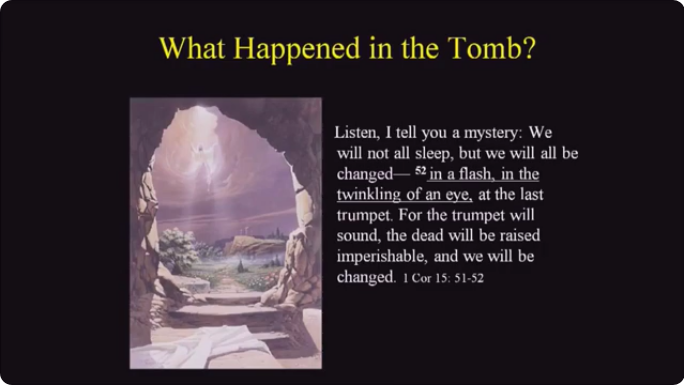To live among the creatures He loved in their world.
Pretty much the same way that we might answer a ‘secularist’ who asks why I think I was created by God when it’s obvious that I came from my mother.
To finish that thought with an actual answer…
The creation of life is not by watchmakers and engineers but by farmers and shepherds. Living things are not machines – not tools made for an end but and end in themselves doing things for their own reasons. Thus living organisms are created by relationships rather than design – parent and child creating this new life together.
Thus while it is obvious I came from my mother, this does not preclude the involvement of God. Nobody controls what happens – not God, not my mother and not me as an embryo. All work together for the result. Likewise, whatever the contribution of asteroids may be, this does not preclude the involvement of God.
I’d say living things are a different kind of machine, a cross between the ultimate freedom of the divine and the clockwork action of the merely material. We are constrained in our actions by our machine nature while freed from mechanical determinism by our divine image.
I will answer this too because I am the same. I was thinking about this earlier this week. Out of three, incarnation, crucifixion, and resurrection, it is the incarnation which is the most important for me – the fact that God became a man to live among us. It connects directly to the idea that love rather than power is the essence of God – as a matter of choice. Choosing love and freedom over power control, God created life and then set aside all power and knowledge to become a helpless human infant. That more than these others tell us about God.
I particularly don’t like the emphasis on the crucifixion as if Jesus were some kind of human sacrifice magic spell to enable God to forgive. That is ridiculous to me. Why would God need such a thing to forgive any more than I do? Yes Jesus died for our salvation and yes it shows how far God will go for our us. But the need/requirement for this tells us more about us than about God. In other words, the demand for Jesus’ death ultimately came from us and our sin and not from God. Yes God/Jesus saw it coming. We are self-destructive and kill the prophets God sends to help us, so it was not very surprising that we did the same to Jesus.
As for the resurrection, there is no doubt this played a key role in giving birth to Christianity. It showed us evil need not be the victor and death is not the end.
Firstly, before respnding to this i want to acknowledge i have read all of the other reepnses in full and value your thoughts guys.
My thoughts, or beliefs on the incarnation i suppose would be a better way to put it, are as follows:
Satan charged God in heaven with the claim He is selfish (simply put)
Satan rebelled and was cast out
Satan was cast to this earth i believe because it is the creation of this planet that somehow brought up the heavenly conflict in the first place
Wheb Adam and Eve fell into sin, at the behest of Satans temptations, it was Satan who demanded blood…he demanded the law be fulfilled.
God had already decided on another plan…to show mercy whilst still fulfilling “the wages of sin is death”
God gave His own life for the short comings of His own creation in order to prove satans charge in heaven was indeed wrong.
After doing that, what about us? Well, thats where the resurrection and ascention into heaven takes centre stage…Christ demonstrates that this is all about redemption and restoration.
The Gospel goes far further than just Christ was born…it clearly illustrates redemption and restoration. We find this doctrine by studying Nebuchadnezzars dream in Daniel 2, and obviously the book of Revelation written by the apostle John whilst imprisoned on the isle of Patmos in the early A.D 90s.
I just dont see that the incarnation focus explains the gospel. What the incarnation does do is prove the promise to Adam and Eve in Genesis chapter 3.15 “your seed will crush his head”.
Sure the israelite nation at the time of Christ got completely mixed up in their bible theology, however given the oppression under Rome at the time, i suppose they had some delusion of another Mosaic type exodus…only in the reverse (the oppressors get driven out).
I see sin and death as a natural consequence, not necessarily an forceful punishment from God. I say thst because we know as mortals we cannot look upon the glorious face og God and live. I remember what happened to Hophni and Phineas (edit…sorry Nadab and Abihu) in the tabernacle…fire came out from the most holy place and killed them. I think that its like a science experiment where one attempts to mix potasium with water…a naturalistic but nonetheless voilent reaction is the result.
I used to use the illustration of Jesus’ death constituting a payment like writing out a check, so all we have to do is put our name there are our debt is paid. Then I got to thinking that if the Crucifixion is like writing a check doesn’t that mean that God can be bought off? That’s the direction that Roman Catholics go with their whole “treasury of merits” business, and that suffers from the question of to whom the debt is owed – is Jesus ‘writing’ this check to the devil? to the Father? to a deficiency in Creation that results from sin? To say it’s to the devil strike me as ridiculous given that Christ’s death is described as of infinite worth, unless you go with a limited atonement where while Christ’s death itself had infinite value only that portion needed to ‘pay’ for all our sins gets paid out.
I go back to the centrality of the Cross, the place Paul treats as the victory. I do this primarily because of one word:
- τετέλεσται
That’s (teh-TEH-les-tie) the one-word sentence that comes out in most English translations as “It is finished!” but means more than that; to gather more of the meaning, it can be rendered as “It is now and forever totally completed”. It wasn’t, as some rather sad commentators have suggested, a surrender because He couldn’t take it any more; no, it was a cry of victory at the point concerning which Paul says:
None of the rulers of this age understood it. If they had known it, they would not have crucified the Lord of glory.
I don’t regard forgiveness as the centerpiece any more, I agree with all the Fathers who said that Jesus defeated death by dying. That wasn’t evident yet – it wouldn’t be till the third day – but it was accomplished; to personify death as Paul and many of the Fathers do, Death bit down on Jesus and found it a bite that broke his jaw. As the prophet said, by dying Christ swallowed up Death.
In this we are the same also. What do we need salvation from? From God? You’ve got to be kidding! That would make God and Christianity into the biggest racketeering operation – for that is what the mobsters do, offer us protection from themselves.
No, what we need salvation from is ourselves. The greatest threat to mankind is mankind. And so for me it is all about the removal of the self-destructive habits of sin. The problem isn’t that God cannot forgive but that sin is a part of us and by itself sin will destroy us. And we cannot remove it ourselves because sin is destructive of free will along with everything else of value in us – like a creeping degenerative disease of the spirit.
This goes hand in glove with what Jesus said repeatedly, “Your sins are forgiven, so go and sin no more.” The second part is the whole point and Paul says the same in Romans 2.
I don’t buy into any of this story you are telling. The only rebellion of Satan in the Bible is in Revelation and it takes place after Christ is born.
id just like to add a wee little bit on to this…Jesus defied the eternal punishment of death, which comes because of transgression, by being raised from the dead. His resurrection and ascention into heaven proved that His death was sufficient for paying the wages of sin and fulfilled the slaying of the lamb in the ancient Israelite Sanctuary Services.
“CSI Jerusalem, Case of the Missing Body” by Russ Breault.
-
The Shroud of Turin: What is it?
Starting at 1:26:46, The Best Explanation

-
I’m betting abiogenesis is a lovely pipe-dream, and all my Louisville kin are–for all their smarts–wrong.
“Defied”? “Eternal”? He defeated death in all forms by dying. A nice way to look at it is to regard death as a trap like an old bear trap–
But when it snapped shut on Him the teeth broke instead of holding Him.
This sounds like sin is a person that earned a payment from Jesus, which is just bizarre. “The wages of sin” isn’t something that could be paid because death is the wage(s) – by sinning, we earn death. He just took our wages and applied them to Himself. If you want to go with the economic model, it wasn’t a payment, it was an account transfer.
That guy is a heck of a fun speaker, so I’m listening to the whole thing.
It’s well worth the time to listen!
This topic was automatically closed 6 days after the last reply. New replies are no longer allowed.
